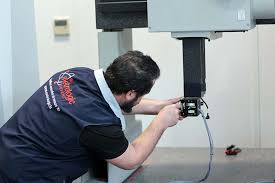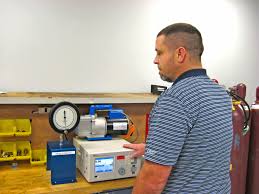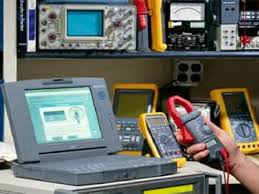Medical equipment calibration is a crucial process that ensures the accuracy and precision of various medical devices used in healthcare settings. In Egypt, the need for ensuring precise calibration of medical equipment is of utmost importance to guarantee the safety and effectiveness of patient care. The calibration process involves carefully adjusting and aligning the medical devices to meet specific standards and guidelines. This article will explore the significance of medical equipment calibration in Egypt and its impact on the quality of healthcare services.
Ensuring Precision: Medical Equipment Calibration in Egypt is an essential aspect of the healthcare industry. Medical equipment calibration is a process that ensures accuracy and reliability of the equipment used in the diagnosis and treatment of patients. In Egypt, medical equipment calibration is overseen by the Ministry of Health and Population, which sets standards and guidelines for calibration procedures. Medical equipment calibration service providers in Egypt must adhere to these standards to ensure the safety and effectiveness of the equipment. Calibration involves testing the accuracy of medical devices such as X-ray machines, MRI scanners, ultrasound machines, and other diagnostic equipment. Hospitals and healthcare facilities in Egypt rely on calibrated medical equipment to provide accurate diagnoses and treatments to patients. Without proper calibration, there is a risk of inaccurate readings and misdiagnosis, leading to potential harm to patients. The demand for medical equipment calibration services in Egypt continues to grow as the healthcare industry expands and modernizes. It is crucial for healthcare providers to work with certified and experienced calibration service providers to ensure the accuracy and reliability of their medical equipment.
The Importance of Medical Equipment Calibration in Egypt's Healthcare

Medical equipment calibration in Egypt's healthcare system is crucial to ensuring the accuracy and reliability of medical devices used in diagnosis, treatment, and monitoring of patients. Properly calibrated equipment helps to guarantee the safety of patients and the effectiveness of medical procedures. Additionally, calibration is essential for maintaining compliance with local and international regulatory standards. In Egypt, medical equipment calibration is particularly important due to the growing demand for healthcare services and the increasing reliance on modern medical technologies. Without accurate calibration, there is a risk of misdiagnosis, improper treatment, and compromised patient care. Furthermore, calibrated equipment contributes to the overall efficiency and effectiveness of healthcare facilities, leading to better outcomes for patients. In order to uphold high standards of quality and safety in healthcare, it is imperative for Egyptian medical facilities to prioritize regular calibration of their equipment. This includes diagnostic imaging machines, laboratory instruments, surgical tools, and patient monitoring devices. By investing in proper calibration and maintenance, healthcare providers in Egypt can enhance the reliability and accuracy of their services, ultimately benefiting the well-being of the population.
Ensuring Accuracy and Precision: Medical Equipment Calibration in Egypt

Medical equipment calibration in Egypt plays a crucial role in ensuring the accuracy and precision of various medical devices used in healthcare facilities. Calibration is the process of comparing measurements taken by a device to a known standard in order to detect and correct any deviations or errors. In the medical field, the calibration of equipment such as blood pressure monitors, thermometers, infusion pumps, and other critical devices is essential for reliable and accurate patient care. Correctly calibrated equipment helps in accurate diagnosis, effective treatment, and patient safety. In Egypt, the calibration of medical equipment is typically carried out by specialized technicians or calibration service providers. These professionals use precise standards and sophisticated testing equipment to ensure that the medical devices meet the required accuracy and performance criteria. Regular calibration schedules and adherence to international standards are essential for maintaining the accuracy and precision of medical equipment in Egypt. This helps in complying with regulations and standards set by health authorities and ensures the reliability of the healthcare services delivered. Moreover, proper calibration of medical equipment also contributes to the overall quality management system of healthcare facilities, ultimately leading to improved patient outcomes and satisfaction. As the demand for quality healthcare services continues to grow in Egypt, the need for accurate and reliable medical equipment calibration becomes increasingly important.
Challenges and Innovations in Medical Equipment Calibration in Egypt

Challenges in medical equipment calibration in Egypt include access to advanced technology and skilled personnel, as well as adherence to international standards and regulations. Innovations in this field include the use of automated calibration systems and the implementation of predictive maintenance techniques to ensure the accuracy and reliability of medical equipment. Additionally, collaborative efforts between industry stakeholders and regulatory bodies are driving advancements in calibration processes and procedures. Overall, the focus on continuous improvement and technological advancements is helping to address the challenges in medical equipment calibration in Egypt.
Standards and Regulations for Medical Equipment Calibration in Egypt
In Egypt, the standards and regulations for medical equipment calibration are governed by the Egyptian Organization for Standardization and Quality (EOS), which sets the mandatory specifications and requirements for the calibration of medical devices. The EOS works in collaboration with the Ministry of Health and Population to ensure that all medical equipment used in healthcare facilities meets the necessary standards for accuracy and reliability. Additionally, the Egyptian Drug Authority (EDA) oversees the registration and monitoring of medical devices to guarantee their compliance with international regulations and guidelines. Adherence to these standards and regulations is essential to ensure the safety and effectiveness of medical equipment in Egypt.
The Role of Calibration in Maintaining Quality Healthcare in Egypt
Calibration plays a critical role in maintaining quality healthcare in Egypt. It ensures that medical equipment and devices are functioning accurately and reliably, which is essential for making accurate diagnoses and delivering effective treatments. In healthcare settings, calibration is particularly important for equipment such as blood pressure monitors, thermometers, ECG machines, and laboratory instruments. Calibration of these devices ensures that they provide accurate and consistent results, which is crucial for making informed clinical decisions. In addition to improving the accuracy of medical devices, calibration also helps to comply with regulatory standards and requirements. In Egypt, healthcare facilities are required to adhere to specific quality and safety standards set by the Ministry of Health and other regulatory bodies. Regular calibration of medical equipment is an essential part of meeting these standards and ensuring the safety and well-being of patients. Furthermore, calibration helps to extend the lifespan of medical equipment, reduce the risk of malfunctions, and minimize costly downtime. By maintaining the accuracy and reliability of medical devices through calibration, healthcare facilities in Egypt can operate more efficiently and effectively, ultimately benefiting both healthcare providers and patients. Overall, the role of calibration in maintaining quality healthcare in Egypt cannot be overstated. It is a fundamental aspect of ensuring the accuracy, reliability, and safety of medical equipment, which is essential for delivering high-quality healthcare services to the Egyptian population.
The Impact of Proper Calibration on Medical Equipment Performance in Egypt
Cairo calibration services
Proper calibration of medical equipment has a significant impact on its performance in Egypt. When medical devices are accurately calibrated, they are able to provide reliable and precise measurements, leading to better patient care and diagnosis. This is particularly important in a country like Egypt, where access to quality healthcare is crucial for the well-being of the population. Calibrated medical equipment also ensures the safety of patients and healthcare professionals by reducing the risk of errors and inaccuracies. In Egypt, where resources may be limited, it is essential to maximize the performance of medical equipment through proper calibration in order to make the most of available resources and provide high-quality healthcare services. Furthermore, proper calibration of medical equipment is necessary for compliance with regulatory standards and quality assurance measures. This is important for maintaining the integrity of healthcare practices and upholding the reputation of medical institutions in Egypt. Overall, the impact of proper calibration on medical equipment performance in Egypt cannot be overstated. It plays a critical role in ensuring the effectiveness, accuracy, and safety of medical devices, ultimately contributing to the overall quality of healthcare in the country.
Advancements and Emerging Technologies in Medical Equipment Calibration in Egypt
Advancements and emerging technologies in medical equipment calibration in Egypt have been driven by the increasing demand for accurate and reliable medical devices. The use of advanced calibration tools and techniques, such as laser calibration and computerized systems, has enabled healthcare facilities in Egypt to ensure the precision and accuracy of their medical equipment. Furthermore, the adoption of international standards and regulations for medical equipment calibration has played a significant role in improving the quality and safety of healthcare delivery in Egypt. This includes the use of ISO 13485 for medical device quality management systems and ISO 17025 for calibration laboratories. In addition, the development of innovative calibration software and digital platforms has streamlined the calibration process, allowing for real-time monitoring and data analysis. This has helped healthcare professionals in Egypt to effectively manage and maintain their medical equipment, leading to improved patient outcomes and lower risks of medical errors. Overall, the advancements in medical equipment calibration in Egypt have been crucial in enhancing the overall quality of healthcare services and ensuring the safety of patients. As technology continues to evolve, it is expected that the calibration processes for medical equipment will further improve, leading to more efficient and accurate healthcare delivery in the country.
